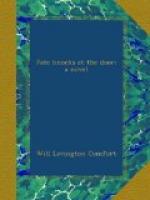There was also a big book in the Captain’s chest—Life and Death on the Ocean—quarto-sized and printed in agate. It was filled with mutiny, murder, storm, open-boat cannibalism and agonies of thirst, handspike and cutlass inhumanities. No shark, pirate nor man-killing whale had been missed; no ghastly wreck, derelict nor horrifying phantom of the sea had escaped the nameless, furious compiler. For four days and nights, Andrew glared consumingly into this terrible book, and when he came to the writhing “Finis,” involved in a sort of typhoon tailpiece—he was whipped, and never could bring himself to touch the book again. One reading had burned out his entire interest. It was not Life nor Death nor Ocean, as he had seen them in ten solid years at sea. He had given the book his every emotion, and discovered it gave nothing back; but had shaken, terrified, played furious tarantellas upon his feelings—and replenished naught. So he turned for unguent to his Book of Books. Here was the strong steady light in contrast to which the other was an “angled spar.” True, here crawled hate, avarice, lust, flesh and its myriad forms of death—not in their own elemental darkness—but as scurrying vermin forms suddenly drenched with light.... There were other and really wonderful books in Captain Carreras’ chest—a bashful welcome to his cabin, and such eager lending from the Captain himself!
This had become a pleasant feature in the young man’s life—the queer kindly heart of the Captain. There were few confidences between them, but a fine unspoken regard, pleasing and permanent like the Carreras perfume. Bedient’s desire to show his gratitude and admiration was expressed in ways that could not possibly shock the Captain’s delicacy—in the small excellences of his art, for instance. To say that the boy was consummate in the limited way of a ship’s cook does not overstate his effectiveness. He did unheard-of things—even fruit and berry-pies, from preserves two years, at least, remote from vine and orchard. The two mates and boatswain, who also messed aft, bolted without speech, but marvelled between meals. To these three, the tension of the Captain’s embarrassment became insupportable, beyond four or five minutes; so that Carreras, a discriminating, though not a valiant trencherman, was always the last to leave the table.
And once after a first supper at sea out of Singapore (there had been a green salad, a fish baked whole, a cut of ham with new potatoes, and a peach-preserve tart), the Captain put down his napkin and coffee-cup, drank a liqueur, reached for his pipe and handkerchief, and suddenly encountering the eyes of Andrew, who lit a flare for him, jerked up decisively, as one encountering a crisis. His face became hectic, and the desperate sentence he uttered was almost lost in the frantic clearing of his throat:
“You’re a very prime and wonderful chap, sir!”
Moreover, Bedient’s arm had been pressed for an instant by the softest, plumpest hand seaman ever carried. Coughing alarmingly in the first fragrant cloud from his Latakia and Virginia leaf, the Captain beat forth to recover himself on deck.




